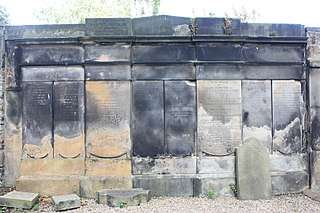James Haldane
| James Haldane | |
|---|---|
 | |
| Born |
James Alexander Haldane 14 July 1768 Dundee, Scotland |
| Died |
8 February 1851 (aged 82) Edinburgh, Scotland |
| Nationality | Scottish |
| Occupation | Evangelist |
| Spouse(s) |
Mary Joass Margaret Rutherford |
| Children |
Elizabeth Haldane Catharine Haldane James Haldane Alexander Haldane Mary Haldane Margaret Haldane Robert Haldane Isabella Mitchelson Haldane Daniel Rutherford Haldane Adamina Dundas Duncan Haldane Helen Haldane George Oswald Haldane James Haldane |
| Theological work | |
| Tradition or movement |
Church of Scotland Independent Baptist |

The Rev Cpt James Alexander Haldane (14 July 1768 – 8 February 1851) was a Scottish independent church leader.
Biography
The youngest son of Captain James Haldane of Airthrey Castle (who died two weeks before he was born),[1] (his older brother Robert Haldane was also a clergyman) in Stirlingshire, he was born at Dundee.
He was educated first at Dundee Grammar School and afterwards at the High School in Edinburgh and University of Edinburgh. At the age of seventeen he joined the Honorable East India Company as a midshipman on board the ship, the Duke of Montrose. After four voyages to India, in the summer of 1793, he was promoted to the commander of the Melville Castle. He started a careful study of the Bible during his voyages, and also came under the evangelical influence of David Bogue of Gosport, one of the founders of the London Missionary Society.
He abruptly deciding to leave the HEICS to adopt a religious life, and he returned to Scotland in 1793, and began preaching on an itinerant basis, including a "missionary tour" of the northern counties in 1797.
Evangelism
In about 1796 he became acquainted with the celebrated evangelical, Charles Simeon of Cambridge, in whose company he toured Scotland, distributing tracts and trying to awaken others to an interest in religious subjects. In May 1797 he preached his first sermon, at Gilmerton near Edinburgh, with encouraging success. In the same year he established a non-sectarian organization for tract distribution and lay preaching called the Society for the Propagation of the Gospel at Home. During the next few years he made repeated missionary journeys, preaching wherever he could obtain hearers, and generally in the open air.
Originally loyal to the Church of Scotland, his studies of the New Testament led him to leave that denomination behind and work in an independent church movement. Along with his brother, Robert Haldane, and others, James established 85 churches in Scotland and Ireland. Churches planted by the Haldanes practised baptism by immersion, weekly communion, and congregational polity (autonomous government). The Haldanes also operated a seminary and were influenced in their principles by other independency thinkers such as John Glas and Robert Sandeman.
As advancing years compelled him to withdraw from the more exhausting labours of travel and open-air preaching, he sought to influence the discussion of current religious and theological questions by means of the press. In later years he adopted Baptist views.[1]
He died on 8 February 1851 aged 82, and is buried in the Haldane family plot in St Cuthbert's Churchyard at the west end of Princes Street in Edinburgh. The grave lies immediately east of the church on the wall backing onto Princes Street Gardens.
Family
He married twice and had 13 children. He married first Mary Joass on 18 September 1793.[2] Believed to have been born on 27 October 1771,[3] she died on 27 February 1819.[2] They had the following children:
- Elizabeth Haldane (1794–1843)
- Catharine Haldane (1797–1885)
- James Haldane (1799–1831)
- Alexander Haldane (15 October 1800[4]-19 July 1882[5])
- Among whose children was Alexander Chinnery-Haldane (1842–1906), Bishop of Argyll and the Isles
- Mary Haldane (1801-7 November 1857[6])
- Margaret Haldane (1803–1889)
- Robert Haldane (1805–1877)
- Father of Richard (Secretary of State for War 1905-1912), John Scott and Elizabeth Haldane, among others.
In 1822 he married for a second time to Margaret Rutherford, daughter of Daniel Rutherford. They had the following children:
- Isabella Mitchelson Haldane (1823–1892), married Richard Burdon-Sanderson (1821–1876) in 1853
- Daniel Rutherford Haldane (1824–1887), physician.
- Father of General Sir James Aylmer Haldane, among others.
- Adamina Dundas Duncan Haldane (1826–1898)
- Helen Haldane (1828–1873)
- George Oswald Haldane (1829–1831)
- James Haldane
Publications
Among Haldane's numerous contributions to theological discussions were:
- The Duty of Christian Forbearance in Regard to Points of Church Order (1811)
- Strictures on a Publication upon Primitive Christianity by Mr John Walker (1819)
- Refutation of Edward Irving's Heretical Doctrines respecting the Person and Atonement of Jesus Christ. His Observations on Universal Pardon, etc., was a contribution to the controversy regarding the views of Thomas Erskine of Linlathen and Campbell of Row.
- Man's Responsibility (1842) is a reply to Howard Hinton on the nature and extent of the Atonement.
He also published:
- Journal of a Tour in the North (1801)
- Early Instruction Commended (1801)
- Views of the Social Worship of the First Churches (1805)
- The Doctrine and Duty of Self-Examination (1806)
- The Doctrine of tile Atonement (1845)
- Exposition of the Epistle to the Galatians (1848).
- The Wisdom of God Displayed in the Mystery of the Redemption
See also
Notes
- 1 2 Monuments and monumental inscriptions in Scotland: The Grampian Society, 1871
- 1 2 "Person Page 31098". Thepeerage.com. Retrieved 2010-08-19.
- ↑ "Explore Kindred Britain". Stanford.edu. Retrieved 13 August 2017.
- ↑ "Person Page". Thepeerage.com. Retrieved 13 August 2017.
- ↑ John Wolffe, ‘Haldane, Alexander (1800–1882)’, rev. Oxford Dictionary of National Biography, Oxford University Press, 2004, accessed 1 Sept 2010
- ↑ "Person Page". Thepeerage.com. Retrieved 13 August 2017.
References

External links

